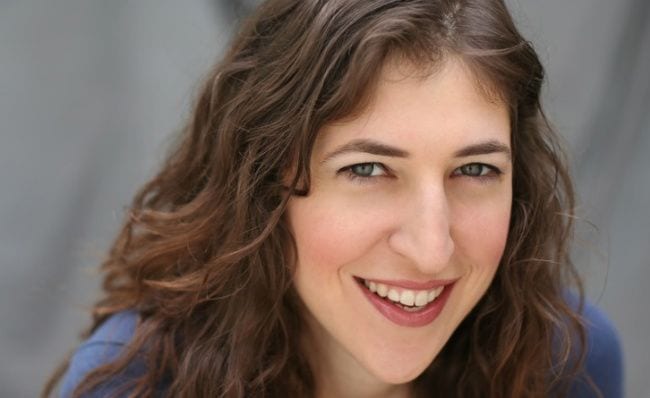
In a perfect world I would go back in time to be an undergraduate majoring in biology. Dr. Mayim Bialik, who plays Amy Farrah Fowler on television’s number-one rated comedy, The Big Bang Theory, would be my professor.
In the real world this notion is entirely probable. Between acting on the 1990s series Blossom and becoming a full-time cast member on The Big Bang Theory, Bialik took 12 years off from Hollywood to pursue higher education. It resulted in a Ph.D. in neuroscience from UCLA.
“The notion of acting really stopped occurring to me,” Bialik told the crowd gathered on January 30 to hear her speak at Morehead State University in Kentucky. Bialik was the inaugural speaker for the university’s Presidential Lecture Series, part of its new President’s Performing Arts and Speakers Program.
Her petite frame looked small on stage in the basketball arena of the school’s Academic-Athletic Center. But what appeared to be four-inch heels gave her a boost behind the wooden podium, and despite an arena filled with students, professors and community members, her talk felt intimate.
Bialik’s primary reason for returning to acting was that her family at the time included two young boys who needed health insurance once she finished graduate school. Her foray back into the public arena included appearances on several shows before landing The Big Bang Theory, now in its seventh season.
Obviously, Bialik isn’t the typical Hollywood actress. There’s the Ph.D. in neuroscience, for instance. On the submitted résumé for The Big Bang Theory, the degree was listed under ‘Miscellany.’ “It seemed vaguely important that I put that somewhere,” she laughed. She’s also an Orthodox Jew whose faith is a huge part of her life. “It’s not a popular thing to say in Hollywood,” she said.
Furthermore, the reason she gave for the talk that night seemed as down-to-earth and honest as it gets: while her role on a successful television show provides her a nice living (and health insurance!), it does not fulfill her completely. What does provide fulfillment, aside from being a parent, is sharing her love of science and advocacy for women in the STEM fields (science, technology, engineering and mathematics). Bialik is also the spokesperson for Texas Instruments, putting a much-needed female face on traditionally and predominantly male-oriented career fields. “My work with STEM and the speaking work I’m doing with you guys right now gives me a larger sense of purpose and fulfillment,” she said.
Bialik’s journey to becoming a scientist wasn’t an easy or obvious one. Her parents were English teachers, and as a child, Bialik unsurprisingly excelled at the humanities. “Math and science were hard for me,” she said. “I assumed I wasn’t good at math and science because the way that it was taught to me didn’t make sense.” And in the mid-1990s, STEM areas were still dominated, in theory and actuality, by males.
“The notion of math and science being for boys was something I never remember not feeling,” Bialik said. Then something changed. When Bialik was a 15-year-old on the set of Blossom, she needed a biology tutor. The woman who got the job, a young UCLA dental student, provided for the first time an explanation of science in a way Bialik could understand. “I never knew you could feel that way about science. I’d never been face to face with someone who was that intoxicated with the universe and science and biology.” The same passion filled the auditorium during Bialik’s talk. “Everything’s amazing to me, and it wasn’t before I had that training,” she said of her science education.
Her early work on the primetime family sitcom Blossom, ran from 1991 to 1995. As Bialik pointed out, it never cracked the top 20, didn’t have an audience of millions, or receive critical acclaim. But Bialik noted the program’s plot points were ahead of their time. Based around the life of a teenage girl, the father character was divorced because Blossom’s mother left to pursue her own life.
“In 1990, to have a show about a woman who simply wanted to leave her family and kind of do her own thing was a very unusual kind of plot.” The same could be said for The Big Bang Theory. In a nutshell, the show is about the funny lives of scientists – a “very interesting group of people” that “really hadn’t been shown on television that way.”
“This is a show about people who don’t fit in and who have interests and desires that don’t match popular cultural notions of what’s cool,” Bialik said. No doubt I echo many in the audience that night when I say that I could see myself being friends with Bialik. Not that she would have time for these friendships, though. In a post-lecture Q&A session, someone asked with a coy reference to Blossom how she balances all the hats she wears.
“I have two main ‘how-do-you-do-its?’” Bialik said. She doesn’t sleep a lot, and she doesn’t have a very active social life. Don’t feel sorry for her though, she told the crowd. The woman is fulfilled, or at least doing a very good job of trying to be.
She didn’t delve too much into her role as a mother who practices ‘attachment parenting,’ as detailed in her 2012 book Beyond the Sling. But she did tell the audience that in life you have to make decisions. No one can have everything. “I knew if I became a research professor, I would not get to be with my children as much as I want to be,” Bialik said. Perhaps one day she’ll return to academia. In an hour that flew by, the student audience got a good idea of what kind of professor she might be: easy going, knowledgeable, passionate and like her television character, very funny.

